16 Proven property investment strategies you may not know about
Numerous investment options are available to investors to diversify their hard-earned money, ranging from equities to bonds, mutual funds to deposits, gold, and real estate.
Among all, investing in property generates enormous profits as it is the only option that provides Financial Freedom. It allows you to create a solid financial portfolio that increases your cash flow and savings.
If you play your cards well, there are numerous advantages to investing in real estate, which is why it is one of the most popular investments. Real estate is driving people in the USA, UK, Australia, Sydney, and many other countries to become property developers.
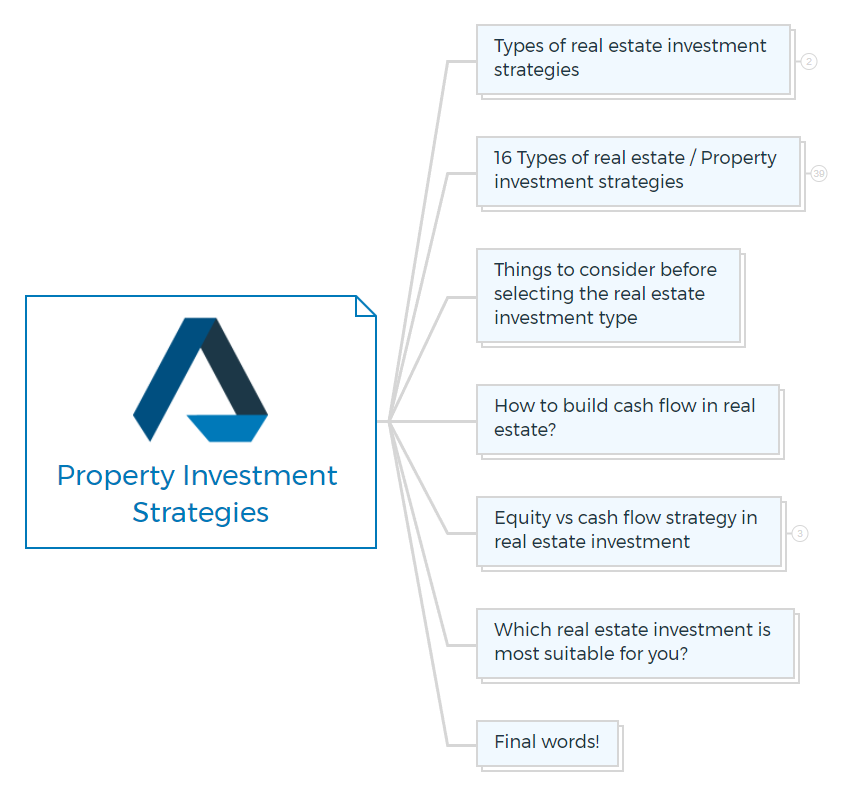
Types of real estate investment strategies
When you think of real estate investment, the first thing that comes to mind is buying a property and renting it out. It may seem a most viable option to you, but it is just a drop in the ocean regarding real estate investment types.
Real estate investment majorly falls into two categories that are active and passive.
Active real estate investments
Active property investments require you to contribute money, time, and physical work. Active investments include things like flipping houses and managing residential rental properties.
These investments are often more profitable than passive investments but are also more expensive and risky.
Passive real estate investments
These are property investments that do not need you to own or manage a property personally. REITs and Crowdfunding are known as passive property investments.
These strategies allow you to invest in real estate without putting down a large sum of money or managing any properties.
Let's quickly dive in and understand the best real estate investment types.
16 Types of real estate / Property investment strategies
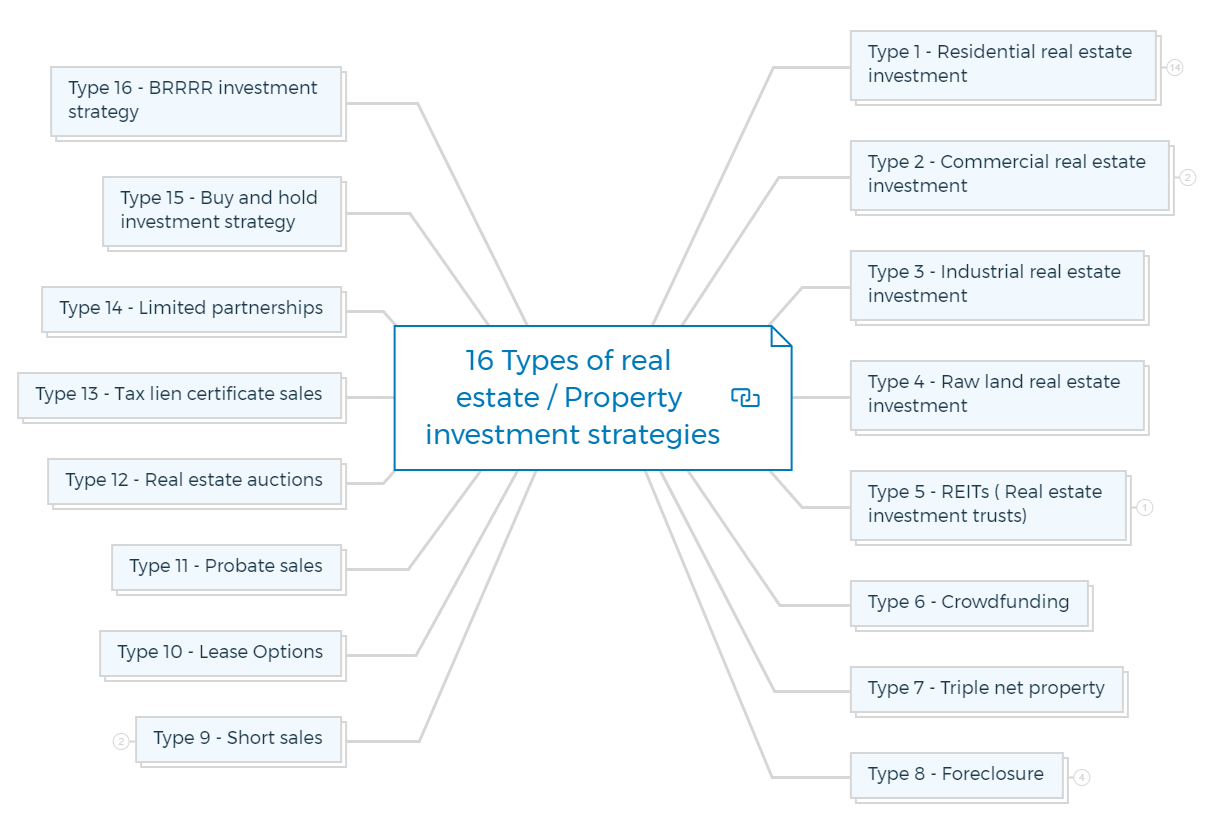
Type 1 - Residential real estate investment
Residential real estate is the most popular investment type in the property development system. It comes in the active investment category, meaning you have money and labour contribution.
Purchasing a property to lease it to someone to live in is a residential real estate investment. This category encompasses a wide range of properties available on the market.
You could buy a family home and rent it to a family, or rent it out as rooms to a range of people who want to share a living space. Alternatively, you may buy a block of apartments and rent each one to a renter, which could result in a significant return on investment.
Another alternative is buying a property and dividing it into two apartments; both can be rented independently. Your choice might depend on your money, the properties available, and the demand for real estate in your area.
There are different types of residential real estate investments that you should know.
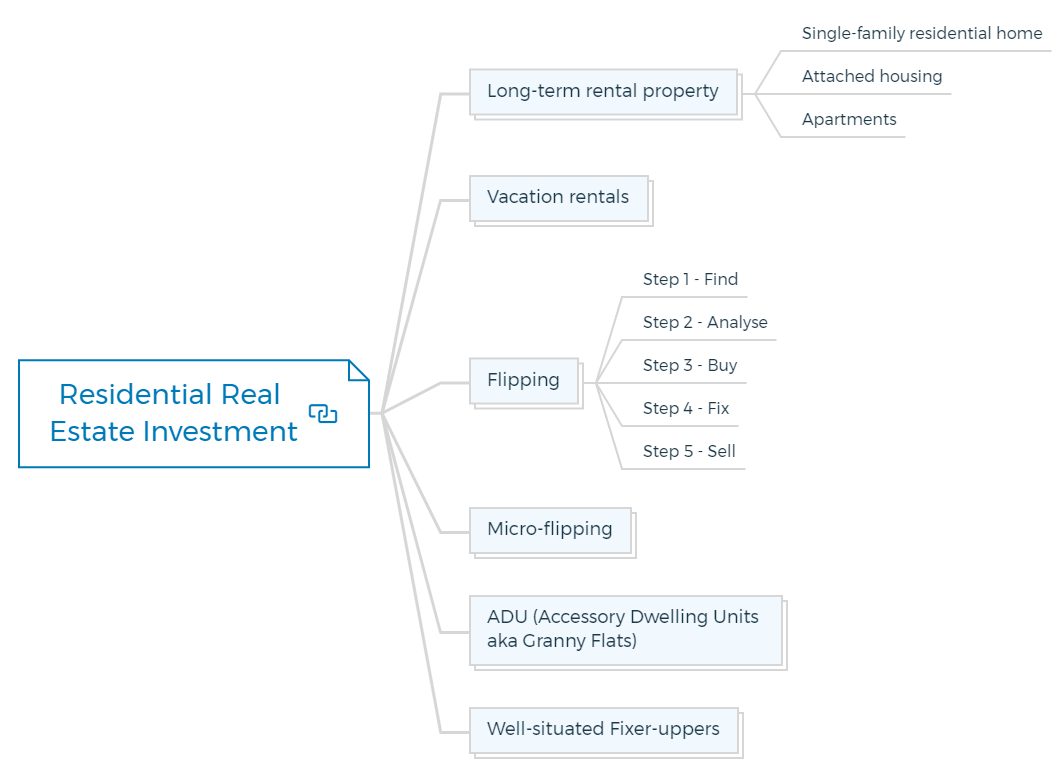
1.1 - Long-term rental property
A long-term rental property is a piece of real estate purchased to rent out to tenants for an extended period. This property might be a four-unit multifamily residence to a small single-family home.
As an investor, you profit from these properties by receiving rent from tenants or profiting from increased property value if you choose to sell them later.
When it comes to maintaining a rental property, some real estate investors prefer to live on-site, which is an owner-occupied multifamily property. However, this is by no means needed.
1.1.1 Single-family residential home
Single-family detached homes perform better than attached or shared dwellings as investments. Single-family homes outperform other property types in a good real estate market because:
- Single-family houses attract more buyers because they offer more solitude.
- Attached or shared housing is cheaper and easier to develop and overbuild; hence it tends to value more slowly.
Single-family homes with one tenant are easier than multi unit apartment buildings with several occupants and units. Vacancies cause lost money.
Check your estimated revenue and expenses with 0% occupancy for a few months. One vacancy in a four-unit apartment building (with the same rents) still brings in 75% of the potential gross rent.
Tips:
Be a successful landlord by avoiding emotional attachments to your properties. The more a tenant makes your rental property their home, the more likely they will stay and return it in good condition, with less regular wear and tear.
Early profiting from a single-family home's monthly cash flow is difficult. Such properties sell for a premium relative to their rent. When you have one tenant, you have no rental income.
1.1.2 Attached housing
As the land cost has risen in many locations, attaching several housing units to a given site makes housing cheap. Property investors that don't want to deal with building maintenance and security choose shared housing.
- Condos - Condominiums are apartment-style properties offered to individual owners. When buying a condo, you buy the unit's interior plus a proportionate interest in the standard facilities, such as the pool, tennis courts, grounds, hallways, and laundry room.
The homeowner's association owns and maintains the common areas and building structures.
Warning:
Avoid investing in condominiums that have been converted from apartments. Although they're generally the most economical housing options in many country places and may have a great urban location, they may have some hidden issues.
These converted apartments are usually older properties with aesthetic updates (new floors, appliances, landscaping, and paint).
- Townhomes - Townhomes are a hybrid between an airspace-only condo and a single-family dwelling. Like condos, townhomes share walls and a roof. Townhomes are two-story dwellings with a small yard that offer greater privacy than condos because no one lives above you.
Before buying, you must read the governing paperwork to know what you legally own.
Townhomes are organized as planned unit developments (PUDs). Each owner has fee simple ownership of his unique lot that comprises his dwelling unit and frequently a tiny section of nearby land for a patio or balcony. Each owner owns a proportionate amount of the common area, part of a larger property.
- Co-ops - Co-ops are communal housing like apartments and condos. You receive a stock certificate representing your building share when you acquire a cooperative, including usage rights to a specific living area per a documented occupancy agreement.
Unlike a condo, co-op associations must approve unit remodels and rentals. In some co-ops, you need association approval to sell your unit.
1.1.3 Apartments
Apartment buildings have good long-term appreciation potential and positive cash flow in the early years of ownership. Like a single-family home, you're responsible for apartment building maintenance.
In real estate financing, apartment complexes are separated by several units:
- Four or fewer units: Because they're considered residential real estate, apartment buildings with four or fewer units have better financing alternatives and conditions.
- Five or more units: These are classified as commercial property and don't enjoy the preferential lending terms of one- to four-unit complexes.
Apartment complexes, especially those with more units, create a tiny positive cash flow even in the early years of rental ownership (unless you're in a pricey market, where it may take two to four years to break even before taxes).
Tip:
Converting an apartment building into condos might enhance value if allowed. This transformation involves knowledge of zoning and remodeling/construction costs.
Real estate development and investment come with inherent risks. To be a successful property developer, you should know the secret the managing and calculating risks in property development.
1.2. Vacation rentals
Vacation rentals are similar to long-term rental properties. You acquire a home, usually in a touristy area, and then rent it out (typically short-term) to tourists who will only be staying for a few days.
Because you or someone who works for you will constantly have to supervise the home's upkeep between guests, this can be a more labour-intensive residential real estate investment.
Most people buy a vacation property for consumption, not investment. Owning a second house might be profitable.
Second-home expenses include mortgage interest, property taxes, insurance, repairs and upkeep, utilities, etc.
Most people don't rent out their vacation homes; therefore, they don't add to real estate investors' returns. If your second house is in a holiday region, you or your property manager can rent out the property.
Tip:
Here are some tax tips from the tax code:
- If you keep your vacation or second home as personal property, you can still make tax-free cash on the side. You can rent your home for up to 14 days a year tax-free.
- You can deduct mortgage interest and property taxes as with other personal properties.
- If you keep the property as a rental (you rent it out more than 14 days a year), you can still use it as a vacation home for up to 14 days a year or 10% of the days gainfully rented, whichever is more significant, and it still counts as a rental.
1.3. Flipping
One of the most active investments you can make is flipping a house. When you flip a home, you buy a fixer-upper that needs a lot of work, then fix it up and sell it.
It is risky because you'll have to put a lot of your own money into the house, and there's a possibility you'll run into further issues and lose money instead of making money. However, if everything goes according to plan, you could make thousands of dollars from the sale.
Here is a brief of the different stages of flipping in real estate investment
The Five stages
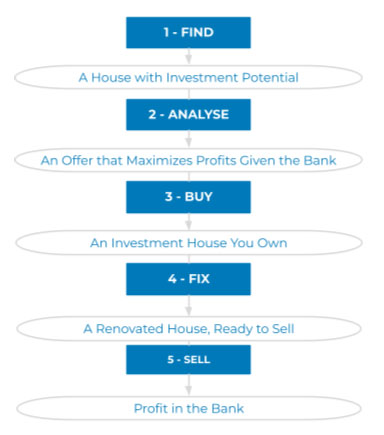
Step 1 - Find
You'll define your unique investment criteria for selecting a house at the start of this step, including price range, acceptable condition, and location.
You'll develop and implement a strategy to find potential investment properties, which you'll approve or reject based on your criteria.
Most properties will not make the cut, but those that do will progress to the Analysis stage.
The result is a house with investment possibilities.
Step 2 - Analyse
The actual testing begins once you're standing in front of a house that fulfills your criteria.
To optimize your profit, you'll need to decide which renovations to do, prepare a detailed and precise improvement budget, and figure out how much you can sell the house for once it's been fixed up. You'll come up with a viable offer by analyzing these numbers.
As a result, an offer that optimizes revenues while minimizing risk.
Step 3 - Buy
This stage begins with your offer to the seller and ends with your decision to abandon the flip. After accepting an offer, you'll hire professionals to do a final inspection of the property, including a professional inspector and maybe an appraiser to double-check the statistics.
If everything checks out, you'll close on the house and move on to the Fix stage.
The result is you own an investment property.
Step 4 - Fix
The step-by-step building plan you'll create in this stage depends on the improvement budget you generated in the Analysis stage. Your ability to implement the plan swiftly and fully determines your profit.
Any big blunder can reduce or eliminate your earnings; thus, following a step-by-step improvement approach is essential.
The result is a refurbished home that is ready to market.
Step 5 - Sell
You are set up for success in this final stage if you found a good buy, completed the correct analysis (including a realistic selling price), and successfully implemented your development plan.
You can increase the earnings from your flip by adding effective marketing and some well-chosen finishing touches.
Result: Money in the bank
These five levels correspond to the five hats you'll wear during a flip. Each one symbolizes a primary concentration area and skills you'll master.
1.4. Micro-flipping
Micro-flipping is a less extreme variant of flipping a house where you buy homes for less than their potential market value and resell them rapidly, usually without extensive modifications. Micro-flipping is less beneficial than traditional flipping and comes with less risk.
1.5. ADU (Accessory Dwelling Units aka Granny Flats)
ADUs, or accessory dwelling units, are additional living spaces on your property that you rent to a tenant, usually a family member. Examples of ADUs are granny flats, basements, and sheds transformed into tiny dwellings.
Operating an ADU is often less expensive than maintaining another property, so it's an excellent alternative for individuals looking to generate some ongoing passive income from their current residence.
1.6 Well-situated Fixer-uppers
Serial home selling is a variation on the tried-and-true real estate investment technique of buying well-located fixer-uppers and adding more value than they cost.
To get the entire homeowner's capital gains exemption of up to $250,000 for single taxpayers and $500,000 for married couples filing jointly, you must live in the fixer-upper for at least 24 months.
For example, you buy a fixer-upper for $275,000 and use the following 24 months to invest $25,000 in improvements (paint, repairs, landscaping, appliances, designer items, etc.) and sweat equity.
After transaction charges, you can sell one of the nicer homes in the neighborhood for $400,000 net. Your $300,000 investment ($275K + $25K) yielded a tax-free $100,000 profit.
You've averaged $50,000 yearly, which isn't bad for a tax-free second income without office hours. Many states also let you avoid state income taxes on the sale of your home, using many of the same rules as the federal government.
Type 2 - Commercial Real Estate Investment

2.1 Office Real Estate Investment
As it is clear from the name, office real estate investment is the acquisition of office space that is rented to a company for an extended period. Business leases are often long-term, which means that once you've found a dependable tenant, you won't have to worry about your investment for a long time.
The advancement of technology and everyone's reliance on it gives rise to several organizations needing office space.
Property developers with several offices in their portfolios can benefit from this type of property investment.
Be cautious while investing in this commercial real estate project because it is one of the first victims of an economic downturn. Even though most leases are for an extended period, a corporation might go out of business overnight, leaving you without a way to pay your rent.
The situation becomes worse if you discover that the firm owner has not been held personally accountable.
2.2 Retail Real Estate Investment
The second most common commercial investment is - retail real estate investment. You will hardly find any big city without a shopping mall or a series of shops on the main street. Even small towns have developments in shops, cafes, and restaurants.
Not every business owner can afford to buy their property, especially when they are just starting. It simply indicates that there is a strong demand for firms looking to lease space. A lease will be created for a certain period and at a set rate, with predetermined times when the rent will be reviewed.
Once the property has been leased to a business, this gives the investor some peace of mind. It would help if you hunted for either a single property or a group of properties; property developers with a substantial sum of money would prefer to buy the entire mall.
During my early days in the real estate industry, I feared investing in and through property development. It occasionally prevented me from making a huge decision, and I began to observe several other investors.
I want to share my observation on why so many property investors fail to replicate their investment success as developers. You can also take what I've learnt from their blunders and apply it to your own success.
Check out these 5 primary reasons why investors fail at property development.
Type 3 - Industrial real estate investment
All lands, buildings, and other structures that accommodate industrial-sized activity are considered industrial real estate. Most industrial properties are less expensive to buy than residential, office, or retail assets.
It is because the average industrial unit is wholly unfurnished and only has access to power and water. Production, assembly, warehousing, manufacturing, research, and distribution of commodities and products are examples of industrial-sized activities.
Businesses choose these units because they may modify the space to meet their specific needs; this is usually less expensive than adapting an existing setup. Industrial real estate investment could be the best option for first-time investors as it requires low operating costs and little management.
When looking to buy an investment industrial unit, location is quite essential. It should be conveniently accessible near a good road network, rail, or maritime routes. Moreover, industrial development must not affect residential or neighbouring areas during its activities. It's also crucial to ensure that a potential building has enough height clearance for forklifts or other machinery that a company might want.
Are you scared about getting started in real estate development? Enrol in QuickStart Property Development Course. The quickest way to grasp the fundamentals of real estate that are essential for your every development project.
Get The Edge Now!
Discover the transformative power of our FREE EDGE platform and
unlock a world of opportunities at no cost!
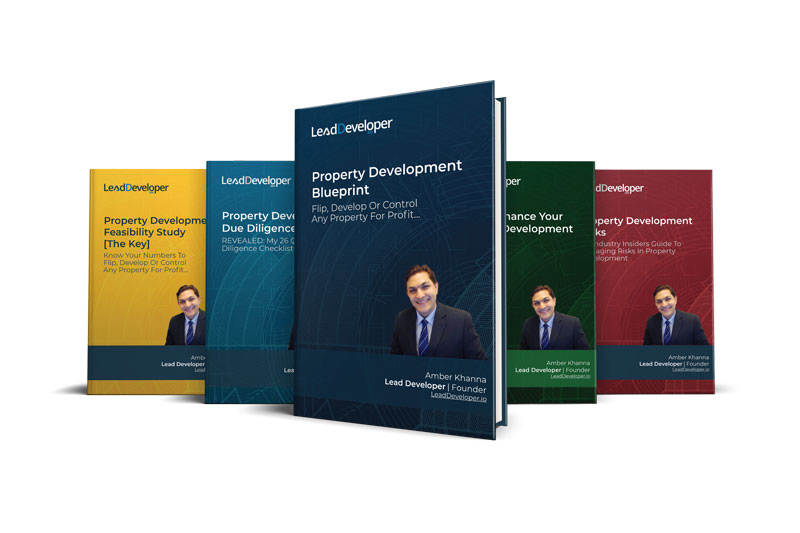
Your Real Estate Toolkit Awaits!
Free eBooks, Courses & Feasibility Suite Trial—Join Today!
✓ Unlimited FREE Trial: Experience the full power of our Feasibility Suite with hands-on demos
—explore without limits, no time pressure & without commitment or credit card!
✓ Learn from Success: Dive into real-life case studies for practical insights.
✓ Engage, Inquire, and Innovate: Ask questions, request features, and engage in lively discussions.
✓ Showcase Your Projects and Gain Insights: Share your projects and get personalised feedback.
✓ Free Resources Galore: Access a treasure trove of free resources,
eBooks & courses to keep you informed.
✓ Exclusive Training: Enjoy members-only training to sharpen your skills.
Type 4 - Raw land real estate investment
The type of property that has nothing on it is raw land. Developers commonly refer to this type of land as undeveloped or agricultural land.
Many property investors believe raw land to be a desirable investment option because it has finite resources and is less expensive to purchase than developed land. I recommend a land loan to buy land for planning and development.
Investing in raw land also saves you the effort of renovating and worrying about stolen or damaged property. There is no need for property insurance in this type of investment. This investment type has the disadvantage of not generating revenue on its own.
Savvy investors have made billions of dollars by taking the raw property, getting the proper entitlements, and then selling the plots to commercial and residential real estate developers (primarily home builders). Investing in land requires:
- Do your homework - It would help if you bought land in a fast-growing location with a housing and land shortage. Learn the area well. You shouldn't follow the advice to buy property in another state. Nor should you buy raw property because you heard an attractive opening bid price for the government excess land sale.
- Know costs - To estimate your annual cash drain, total your annual carrying costs (such as real estate taxes). Will you be able to fund your tax-advantaged retirement accounts completely? If not, consider missed tax benefits a cost of land ownership.
- Identify land improvements - Engineering fees, map and permit expenses, running utility, water, sewer lines, roads, curbs and gutters, landscaping, etc., cost money. Suppose you plan to construct on the land you buy, study costs. Improvements usually cost more than expected, so don't create optimistic estimations.
- Know zoning and environmental regulations - Developing land increases its worth. Never buy land without knowing its zoning and what you can build. It also applies to environmental limits that may be in place or come into force without warning, reducing your property's value (with no compensation).
Type 5 - REITs ( Real Estate Investment Trusts)
REITs, or real estate investment trusts, act as trusts and manage various real estate investments. REITs, unlike many of the other possibilities, are considered passive investments.
Instead of owning assets, you can invest in a REIT and get income from the properties the company manages. Real estate investment trusts are real estate investments that outperform the market, resulting in higher returns on your investment.
You can choose from various REITs in Australia to better leverage your portfolio, including retail, office, healthcare, residential, and mortgage REITs.

Public vs Private REITs
REITs often have conflicts of interest that aren't disclosed or pay above-market fees, which lowers cash flow and ROI. REITs listed on major stock exchanges must meet SEC reporting standards.
- Public REITs trade daily on a stock exchange so investors can buy and sell at will. Liquidity, like other liquid investments, has its downsides. REITs may encourage frequent transactions due to emotional decisions or market timing.
- A public business must have independent directors. Shareholders elect directors.
- REITs must publish quarterly financial reports like other public firms.
Unless you're an educated, experienced real estate investor willing to perform extra homework, avoid private REITs. Private REITs don't have transparency obligations because they're not publicly listed.
Type 6 - Crowdfunding
Real estate crowdfunding platforms give investors access to various high-yielding assets previously only available to the wealthy. While investors benefit from the convenience of acquiring assets, this sort of real estate investment comes with a high level of risk.
Accredited investors or those with a high net worth are often excluded from crowdfunding platforms. Non-accredited investors can also invest on some platforms.
Non-traded REITs, or those not traded on a stock market, are the most common real estate investments made through real estate crowdfunding platforms. Regarding non-traded REITs, your money could be locked up for years with no means to get it out when you need it.
Start your development journey by following my secret Property Development Process.
Type 7 - Triple net property
Triple net property is a net lease in which the tenant pays some or all operating, repair, and maintenance costs. Property Investors like triple net properties because tenants pay for most operational costs and maintenance.
Triple net properties are marketed to investors who want to escape day-to-day management.
These investments may seem like real estate investments, but they're an investment in the net cash flow (after debt service) from a lease to a credit tenant and are promoted depending on the cap rate.
Type 8 - Foreclosure
The term "foreclosure" refers to the process through which a lender takes possession of a property where a loan is in default.
Determine your state's foreclosure process before pursuing foreclosures. Check with your lender, real estate agent, attorney, or title business rep. Your state is one of two:
In a deed-of-trust state - A third party or trustee retains the property title. If loan payments aren't made or are in default, the trustee can take back the property. Without court action, the deed of trust states can foreclose in 60 to 120 days. It is a non-judicial foreclosure process.
The mortgage state - It has no trustee or third party. When a mortgage defaults for non-payment or other breaches, the holder must seek legal remedies, including judicial foreclosure, which can take longer than a non-judicial foreclosure.
A typical foreclosure has four steps and four purchase possibilities.
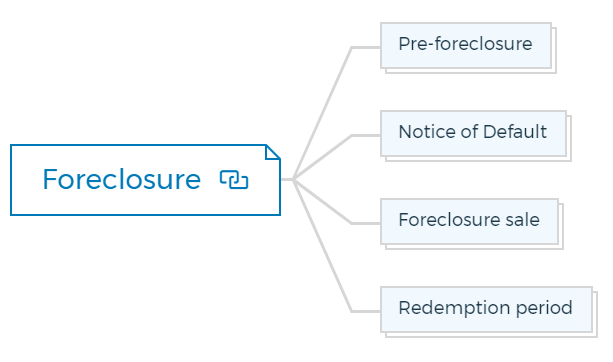
Pre-foreclosure
Pre-foreclosure is before the lender submits the Notice of Default, which starts the legal foreclosure process. Before the actual foreclosure begins, you can locate properties where the owner is behind on mortgage payments or breaking other loan terms. Finding defaulting owners is crucial.
Notice of default
First, a Notice of Default is filed. If the owner wasn't concerned when he started missing loan payments, the Notice of Default should be a real wake-up call.
An owner who receives a Notice of Default may be motivated to sell since they know the lender has started repossession proceedings. Not many owners facing foreclosure know that late fines, penalties, and legal fees degrade their finances.
Foreclosure sale
The foreclosure process differs from state to state. It depends on whether the loan is secured by a mortgage or a deed of trust.
Redemption period
Some states allow the borrower to redeem the property after the sale during a redemption period. They can pay the amount owing, including the loan balance, late charges, legal expenses imposed by the lender, and all sale costs.
It is time to negotiate the borrower's deed. The buyer gets the borrower's redemption rights and can redeem the property if successful.
Type 9 - Short sales
Some of the best properties aren't exposed to the general market, where competition might drive the price. They also know that the best deals can be made with motivated sellers, and there's no stronger motivation than the prospect of foreclosure and credit disaster.
A short sale is when you acquire a property from the owner, and the lender accepts less than the loan total as full payment.
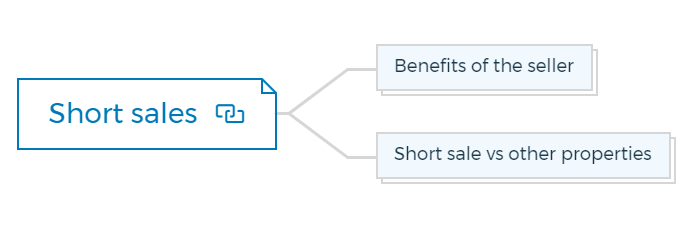
Benefits of the seller
With the rise of subprime and zero-down-payment loans in the mid-2000s and the decrease in property values, many owners had negative equity in their homes in the late 2000s.
They couldn't sell the properties since the selling proceeds wouldn't cover the loan sum (a situation known as being upside down).
Some owners had other financial issues and few savings, so they were unlikely to continue paying debt service payments on the upside-down home. This owner should consider a short sale.
The current owner or seller earns no cash from a short sale, although it can help him minimize credit harm (because he will likely want to be a homeowner someday).
Who could be a better tenant than the existing owner? The current owner may not own the property, but he can still reside there. Staying in the house reduces the stigma of foreclosure. A tenant can help you secure a property loan.
Short sale vs other properties
Buying foreclosures or REOs can be difficult for investors. With foreclosures, the public auction is announced and known to all real estate investors, but there is minimal information and rarely an opportunity to undertake sufficient due diligence. Buyers can't often inspect the property inside. Foreclosures are often surprising.
The best homes at foreclosure auctions attract other buyers willing to spend more if they can make a profit later. You must also have 10% of the purchase price in cash and get a loan for the balance within 30 days.
With a short sale, you can negotiate for a sale closing date that gives you more time to locate financing. A short sale avoids the complexities of a borrower's redemption in a judicial foreclosure.
Tip:
Find pre-foreclosure homes and strike a contract to buy them from the owner before he loses it and damages his credit.
These situations became more common when borrowers took out loans equal to (or higher than) the property's entire value. The aggregate debt of some borrowers exceeded the property's value.
Type 10 - Lease Options
A lease option is an excellent method to invest in property, keep ownership of a home and eventually buy it without putting down a large sum of money as a down payment.
A lease option is a contract that combines two different types of contracts into one.
A lease option requires the owner to sell but not the renter to buy. Until the tenant exercises the option, it's a unilateral contract. The option price (buying price) is a crucial issue with lease options.
This amount can be a fixed price based on current market value, but it's often a future projected value based on predicted appreciation with set exercise time constraints.
In a market where the seller forecasts 5% annual appreciation, a home worth $200,000 today might be offered as a lease option with a $210,000 option price that can be exercised at any point in the next 12 months.
A prudent buyer doesn't exercise the option if it's more than the property's value. When there are few buyers and sellers are eager to sell, lease solutions are easier to find.
Lease options are most prevalent with single-family homes and condos, but any property can employ them. In almost all locations of the country, lease option demand exceeds supply.
Lease options aren't simply a terrific way for investors to invest in a property; they also help first-time buyers ease into home ownership. Real estate lease choices are in high demand; thus, they're rarely publicised.
You may need to run your ad. You can also respond to "home for rent" adverts. A small ad often produces a significant reaction when selling a property with a lease option.
Type 11 - Probate sales
Death creates better real estate buying possibilities than taxes. Every day, someone in your region dies and leaves behind unneeded real estate.
Executors of the estate (or the public administrator if the owner dies without a trust or will) sell these properties at probate sales.
Before a probate sale is consummated, there are waiting periods and judicial approval. Also, overbidding is common. A potential buyer can use the overbid process to appeal straight to the court to outbid you and purchase the property for more than the existing offer.
The right to overbid generally requires a 5-per cent higher offer. Be prepared to raise your bid if this happens. Don't overpay in a bidding war. Before bidding, set a limit.
Type 12 - Real estate auctions
Builders and investors sometimes use real estate auctions to sell excess inventory at below-market prices. Don't mix these auctions with foreclosure auctions.
These are public auctions that may also sell antiques or collectibles.
In strong real estate markets, even new home builders use private auctions to sell their properties in low-demand locations.
Individuals, governments, and auction firms use this strategy to sell real estate. Local yellow pages often list auctioneers. Like any auction, the purpose is to push up the sales price by generating interest and competition. The seller may set a minimum or reserve price to prevent selling too cheaply.
Newspapers, radio, TV, and the Internet promote these real estate auctions with attractive prices. They claim to have various properties and offer attractive deals, such as 10 acres of land for $5,000. Who knows how remote the property is?
Note:
Too many individuals fight for the rare, excellent property at auctions, so property investors rarely benefit. Plus, reserve or minimum pricing is so near to the property's market worth that the buyer pays retail while thinking he's buying wholesale. Check these auctions for good opportunities.
Follow the due diligence method for selecting property in auctions. Owing diligence isn't often achievable due to a lack of time or information from the auctioneer.
For example, a professional Phase I environmental study is the greatest strategy to minimize the property's environmental concerns. You probably can't afford one for every auction property you like. This is one example of the perils of buying property without due diligence, so don't rush. Real estate is a mistake-proof investment. No surprises!
Type 13 - Tax Lien Certificate Sales
The county liens property owners who don't pay their property taxes on time.
A lien is a legal claim or charges against real or personal property to satisfy a debt or duty, with the right to take the property if the debt isn't paid
The county sells the property in a tax lien certificate auction to pay delinquent property taxes, fines, and fees.
Municipalities don't want to foreclose or wait for payment since they need the money now to pay government bills, so they auction off tax lien certificates to investors. Some property owners will always be unable to pay their property taxes, making tax lien certificates a good investment strategy in real estate.
When you buy a real estate tax lien, you pay the government for delinquent taxes and buy the right to collect them from the property owner.
Over 90% of tax lien certificates are redeemed within 24 months. Tax lien certificates have a nearly 100% redemption rate in owner-occupied residences.
You may have to give legal notices and foreclose on the underlying real estate to get your return on investment, so only buy tax lien certificates for properties you're willing to possess.
Tax lien certificates aren't available in all states, and you can't regulate redemption. Real estate investors who do well with tax lien certificate sales buy many liens to spread out payoffs.
Also, they read the fine print of government rules and regulations regarding these sales because the restrictions vary from state to state and county to county within a state.
Ask your county tax collector if real estate tax lien certificates are a good investment in your area.
Type 14 - Limited Partnerships
A real estate limited partnership is a property investment strategy in which general partners manage the property and incur unlimited liability. In contrast, limited partners don't participate in management choices and have limited liability for losses.
A limited partnership can help real estate investors minimise their day-to-day engagement and liabilities. Limited partners lack autonomy, making limited partnerships passive investors.
In a limited partnership, the general partner manages and sells the property. Upon disposition, many limited partnerships give the general partner 10 to 25% of the appreciation upfront before distributing the rest to the limited partners based on their ownership percentage.
This equity kicker for the general partner usually includes brokerage fees upon acquisition and disposition and market-rate or higher property management and asset management costs.
Some limited partnerships in real estate are nothing more than a pure profit play for the general partner, who gets their money upfront, while the limited partners are held captive and can only hope for their capital and appreciation in the future.
Type 15 - Buy and hold investment strategy
The buy and hold investment strategy is one of the most popular property investment strategies. The idea behind this strategy is to purchase a property and then hold onto it for a long period of time, usually 10 years or more.
This strategy can be a good way to generate income from rent and also enjoy any capital growth that may occur over the long term.
One of the main advantages of the buy and hold strategy is that it can be relatively low risk, especially if you purchase a property in an area with strong rental demand. It can also be a good option if you are looking for a property that will provide you with a regular income stream.
However, there are some drawbacks to this strategy. For example, if property prices in your area fall, you may find yourself stuck with a property that is worth less than what you paid for it.
Additionally, if you need to sell the property before the end of your investment period, you may not make as much money as you hoped.
Type 16 - BRRRR investment strategy
The BRRRR investment strategy is a popular property investment strategy that can be used to purchase property with little or no money down.
The acronym BRRRR stands for “buy, renovate, rent, refinance, repeat” and this strategy can be a great way to build up a property portfolio quickly.
The advantage of the BRRRR strategy is that it allows you to purchase property below market value and then add value through renovations. This can lead to big profits when you eventually sell the property or refinance your loan.
There are some risks associated with this strategy. For example, if you over-renovate the property you may not make your money back, or if property prices in your area fall you may find it difficult to refinance your loan.
Things to consider before selecting the real estate investment type
It is critical to consider the pros and cons of each real estate investment type. Before you commit to any specific real estate investment type, you must consider the following points -
Budget - Budget is, without a doubt, the essential aspect of any investment decision! You must first determine which properties you can afford and then decide which are most likely to yield a profit. If you can buy a house in a terrible part of town or an industrial unit in a lovely part of town, the industrial unit should be the apparent winner.
Management of the property - Any property will need to be managed, whether for yearly upkeep and insurance or for looking after renters and finding new ones regularly.
If you plan to operate the property, be sure you understand the time and financial obligations it will impose on you. Various property types will have different requirements, which could influence your decision.
Location - The cliché "location, location, location" is still accurate and remains the most crucial aspect of property development.
For example, Residential property assessments are heavily influenced by proximity to amenities, green space, attractive views, and the neighbourhood's standing.
On the other hand, Commercial property valuations are heavily influenced by proximity to marketplaces, warehouses, transportation hubs, freeways, and tax-free zones.
Shortlisting a potential site becomes easy by following a complete site acquisition process.
Finance and profit opportunities - Before choosing a property type, you should have researched the many types of financing available, selected the one that best meets your needs, and made preliminary preparations.
It means you'll be aware of your budget and any additional stipulations that may apply; this is crucial in selecting a property you can afford!
Working hard and working smart are two different things.
To ensure proper calculation of each property development project, you should take a smart move.
Why juggle with numbers when you can make accurate calculations with Property Development Feasibility Suite. Won't trust my words? Take a 14-day FREE Trial.
I am sure this advanced software will never disappoint you.
Rental Market - It's crucial to examine whether the region you're buying in has many renters or many property owners. Owner-occupied properties, whether commercial properties or residential properties are less forgiving of landlords. They're also likely to be in an area of town where most renters can't afford to live, which will severely limit your potential tenants and, as a result, your revenue.
Keep your eye on Property Market Cycle and hit profits in your projects.
Current Market Analysis - As soon as you decide to invest in real estate, you should begin learning everything about the industry and real estate markets. It is also an excellent time to start networking and developing a list of connections who can help you in the future, whether with money or advice.
How to build cash flow in real estate?
Building cash flows is a process for properties that aren't cash flow positive when you buy them, but you can boost their yield or earning capacity.
Some strategies to increase a property's income are:
- Change and renovate a property to make it more rentable. It could involve a decorative makeover or an extension, garage, or carport.
- You may offer additional services such as high-speed internet, cable TV, and pool or landscape upkeep. You can negotiate these services at a cheaper cost for a long-term contract, and a premium can be added to the rental.
- When you buy a house, the rentals are sometimes not up to date, and an increase is overdue.
- Sometimes a good clean-up is all it takes to boost rental income.
- You can use a property on a large block of land (especially a corner block or a block with two street frontages) for rentable storage space, such as sheds or vehicle storage.
- Offering a property room-by-room, with a shared bathroom, laundry, etc., can boost your income and provides you with profit on your property investment.
- Changing the room design of a residential home might double your weekly revenue.
Equity vs cash flow strategy in real estate investment
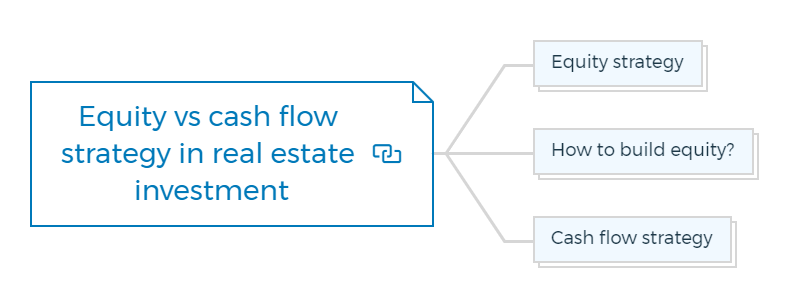
Equity strategy
The Equity Strategy aims to achieve financial independence by eliminating debt and developing home equity.
Equity is your home's value, less its cost.
Equity = Assets - Liabilities
Most homeowners today waste equity. Saving creates wealth, and spending causes debt.
Before building riches, decide if you'll keep it. Will you cash out your $100,000 home equity for a new car? Millions of people use home equity loans to buy clothes, vacations, and cars. For riches, keep what you earn. Please don't waste it like others.
Taking money from a wealth-building equity position to invest in a depreciable asset is terrible.
Depreciable assets include cars and other items that sell for less than they cost.
No real estate property does that (typically).
The Equity Strategy enhances wealth by increasing your home equity and lowering your mortgage.
Tip:
Diversifying is critical if you focus on real estate as a wealth-building strategy. Maintain a diverse portfolio of investments to diversify your risk. Having a diverse portfolio reduces the danger of one rental market segment becoming soft.
How to build equity?
Equity-building steps
- Choose between saving and spending.
- Set short- and long-term goals.
- Decide if long-term goals trump instant enjoyment.
- Read and apply the strategies discussed above.
- Write down your goal-achieving plan.
- Don't deviate.
- Accumulate real estate wealth!
Cash flow strategy
Building wealth and earning money are two separate things. Positioning yourself to develop wealth while producing enough income to meet your needs is nice to achieve both.
Building rental properties below market value allow you to get a below-market mortgage. You can skim the monthly difference to make money. $1200 rent on a $1000 mortgage leaves $200 to "skim." You must save some for upkeep and vacancy, but the rest is income. Buying multiple properties increases income and skimmed money. It can replace a full-time salary or provide extra revenue.
As a landlord, your tenant reduces your mortgage each month. Your debt and equity decrease each year with no effort.
If money is tight, selling rental properties may be enticing. Selling one could help you maintain others, buy another, or pay expenses.
You're not a "builder" if you rent a new home for a few years. You don't have to provide service as an owner, unlike builders.
Instead of selling, cash out some equity in a good-skim rental property. I don't like cashing out equity, but it's better than selling a house for cash flow. If your rental's mortgage payment is less than the rental revenue, you can refinance and cash out the equity.
The new mortgage payment will be larger but perhaps below rent. Keeping the property lets you develop equity while paying off the mortgage.
Which real estate investment is most suitable for you?
The optimal real estate investment type depends on your circumstances, objectives, market location, and preferred investing style. While many accredited investors prefer a more apparent answer, deciding on the best investment property is subjective.
Choosing the perfect property type refers to assessing the benefits and drawbacks of each option. Still, investors should consider a few crucial considerations as they search for the optimal choice. It is where the need for expert consultation comes. Don't worry; you can contact me any time and ask your queries.
Before starting any development projects, I suggest joining my Real Estate Mentoring Program For Property Developers. Many of my students have entirely transformed their careers by joining this program. You could be the next!
I will guide you on everything, from JV agreements to no-money-down deals. Join the waiting list and open your door to success.
When deciding on the ideal investment property type for you, remember that many investors have success with various property types. It's relatively uncommon for investors to start with residential real estate before commercial real estate. There's no reason why investors can't succeed in various property types.
Final Words!
With the growing population, the demand for housing and other real estate properties is increasing each day. It is the right time to roll up your sleeves and get the top position in the cut-throat competition of property development.
Here is the list of structured property development courses for beginners, intermediate, and experts or real estate.
To begin with, you can choose the Property Development Starter Pack or the FREE Quick Start Property Development Course.
FAQs

